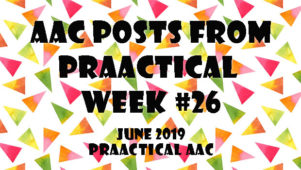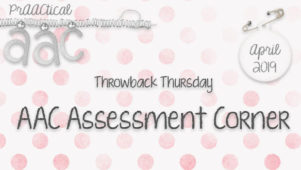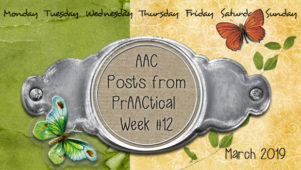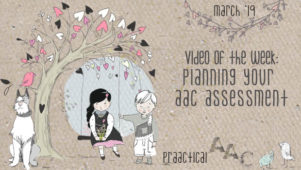PrAACtical Questions: How Do I Find Good AAC Service Providers?
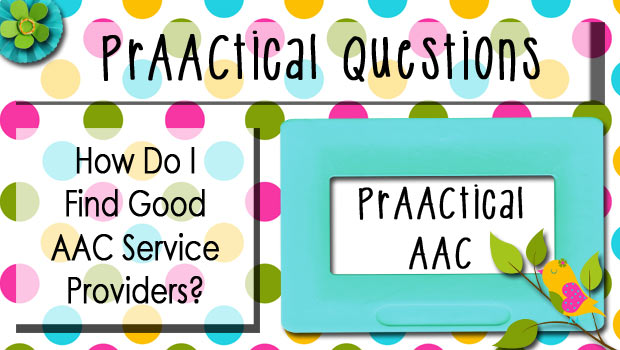
AAC is a field that involves many different disciplines, including OT, PT, SLP and education. In the best-case scenario, professionals in these disciplines work together to evaluate and provide intervention for the individual with little or no functional speech. If that option is not available, consider what discipline makes sense in your particular situation. For example, individuals with complex motor impairments may be best served initially through an OT who knows how to identify the best means of accessing AAC devices as the primary AAC service provider. For a child who is just learning to communicate, a speech-language pathologist (SLP) may be the best person to coordinate AAC services. A comprehensive AAC evaluation will always have the SLP playing a central role, which is important because of the special knowledge that they have about language and communication.
How do you find an SLP with adequate skills in AAC?
While there are no true fail-safes, some degree of quality assurance is built into professional credentials and licenses. For example, SLPs certified by the American Speech-Language-Hearing Association (ASHA) are guided by documents that describe what knowledge base they should possess in order to provide AAC services. They are also held to specific ethical codes.
Certification and state licensure requirements generally state that they participate in a set number of continuing education activities in order to stay current in the field of communication disorders. However, neither ASHA certification nor state licensure requires that the speech-language pathologist have any training or experience in AAC.
–
Finding an SLP who can meet the AAC needs of a particular individual is not a straightforward or easy task. Aside from word of mouth, one of the best ways to know who in your area provides AAC services is to contact professional organizations. They can provide you with lists of members in your area. Keep in mind, though, that while membership in an AAC-related organization is important, it is no guarantee of high-quality services. Organizations you may wish to contact include:
- ASHA, the American Speech-Language Hearing Association: www.asha.org. Has a separate group (SIG 12) specifically for AAC; They can send you a list of SIG 12 affiliates in your state or area.They can also send you Preferred Practice Parameters, standards that guide speech-language pathologists in planning and implementing AAC services.
- USSAAC, the United States Society for Augmentative and Alternative Communication (www.ussaac.org); Involves professionals from various backgrounds and AAC users/consumers; Can send a membership list for your state.
- Your state’s assistive technology project, e.g., FAAST, the Florida Alliance for Assistive Services and Technology (www.faast.org): Provides AT support through Regional Demonstration Centers throughout the state. You can find a link to the tech act project in your state here.
- ESE, the Exceptional Student Education (special education) office in your local school district; Should be able to tell you what AAC resources are available in your school district.
–
Once you have some leads, you still will want to do some due diligence.
1) Ask questions. (See below for sample questions to ask.)
2) Check their credentials. Ask to see a copy of their ASHA Certificate of Clinical Competency (CCC). If a professional holds the CCC in speech-language pathology that means that they have successfully completed a master’s level training program in communication disorders, participated in a Clinical Fellowship period under the supervision of a more experienced clinician, and passed a national exam. ASHA can also tell you if that individual is a current ASHA member. Ask to see a copy of their state license. In most states, you can contact the Department of Business and Professional Regulation to see whether their license has been revoked for any reason.
3) Ask about how they conduct their AAC evaluations or treatment sessions. Does this seem like a person who would work well with your family member? Would it meet your needs?
4) Ask for references. Talk with individuals and families who have received services from this professional. What was the best thing about working with this professional? The most difficult thing? How well/poorly did they meet your expectations? How has the child’s/adult’s communication changed since working with this professional? Would you consult this professional again?
5) Find out about charges and billing procedures. Also, if an AAC device is recommended, can they help find funding for that device? How successful have they been in obtaining fund for AAC devices?
–
Talking with the Potential Speech-Language Pathologist: Questions to Ask
1) AAC TRAINING AND EXPERIENCE
What kind of training have you had in AAC?
LOOK FOR: Courses at the graduate level or attendance at multiple AAC conferences, workshops, etc.; A few university programs offer majors/minors or other specializations in AAC
What do you do to stay current in the field of AAC? (As with all fields that involve technology, the AAC field changes quickly.)
LOOK FOR: Memberships in organizations dealing with AAC, such as USSAAC or divisions within larger organizations, such as ASHA’s SIG on AAC (#12), or RESNA’s AAC group; Recent attendance at workshops or conference presentations; Reading AAC journals and periodicals; Networking with colleagues.
·
What kind of hands-on AAC work do you do on a regular basis?
LOOK FOR: Regular involvement with individuals who need/use AAC; Experience with individuals who are somewhat similar to your family member (e.g., similar age, type of disability, level of severity, etc.).
–
What kind of AAC devices and equipment do you feel comfortable in using?
LOOK FOR: A range of devices, including those that do and do not use technology; Find out what AAC apps they use in treatment and evaluations; Experience in programming and using these devices.
–Where do your referrals come from?
LOOK FOR: Referrals from individuals and/or agencies who are respected members of the medical, educational, or disability community.
2) AAC RESOURCES AND EQUIPMENT
What AAC materials, equipment, and apps do you have?
LOOK FOR: A wide range of devices, from the very simple to the very sophisticated; Devices that are most applicable for the individual being assessed; Evidence that the equipment is current; Evidence that the professionals involved know how to program, use and teach use of the various pieces of equipment, apps, and software.
What would happen if you needed a piece of AAC equipment that you did not have?
LOOK FOR: Evidence of a plan to access some collaborative relationship where equipment could be borrowed or rented.
3) THE ACTUAL SERVICE: AAC EVALUATION, CONSULTATION, OR TREATMENT
What is the purpose of the AAC assessment (or intervention program)?
LOOK FOR: A purpose that matches your own. For example, you may want to see what technology may be appropriate for your family member, or you may want to know what course(s) of treatment will advance the communication skills of your family member.
Can you explain how the assessment or intervention will be carried out?
LOOK FOR: At least some of the evaluation to occur in natural environments (i.e., the home, school, daycare, or workplace); Evidence that the SLP has a specific plan in mind; Evidence that the SLP will work with or consult professionals from other disciplines.
What is my role in the assessment/intervention?
LOOK FOR: A specific plan for involving significant others; A level of involvement that you feel comfortable with; Expectations that are consistent with your own (e.g., if a particular treatment approach requires a significant amount of family involvement/time/training may work for some families, but be impossible for others); Respect for family priorities and perspectives.
What, if any, financial gain would you experience as a result of this assessment/intervention?
LOOK FOR: Objectivity; Individuals who are not overly influenced by the income they may generate as a result of making specific recommendations; For example, do they receive commission or other financial compensation for AAC devices recommended and purchased?
What should I expect to happen as a result of this evaluation/intervention?
LOOK FOR: Specifics that meet your needs and expectations (e.g., develop and implement an individualized program, trial use of an AAC device, follow-up visit); Written documentation; Opportunity for follow-up.
What might come up during the evaluation/intervention that would be outside your area of expertise? How would you handle that?LOOK FOR: Evidence that the professional knows what is outside his/her ability to assess/treat (Everyone has their limitations; the danger is when those limitations are not recognized or acknowledged.); Referral to appropriate sources.
Obviously, each individual situation is different. The things that are critically important to you may not be as relevant to someone else. You may very interested in an AAC evaluation that will explore different iDevices and apps. Another person may be looking for someone who can teach semantic compaction or 2-switch scanning. These sample questions and comments are just a starting point. They can be used to open the channels for discussion with potential AAC service providers and modified to meet your individual needs.
—
–
–
Filed under: PrAACtical Thinking
Tagged With: assessment, FAQs, SLP
This post was written by Carole Zangari

